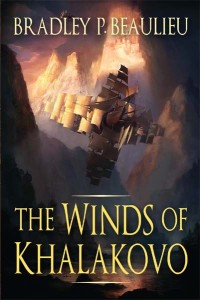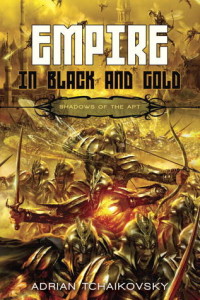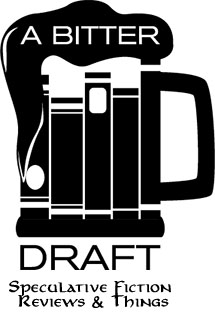Literature, as a whole, is a very interesting entity. Pick a book on any site, be it Amazon or Goodreads or wherever else – you’ll see part of the spectrum that forms people’s varying opinions on said book. It could have very average, mediocre ratings – say a 3 or a 3.5 star rating on either site – due to the tug-of-war that is the (terrible) star-rating system. On one end you’ll find people who adored every aspect of the story, characters, world and all. On the other, there are people who cannot fathom how said book was even published. Every person that has rated the book has different experience in the genre – they could rarely read fantasy or fantasy could be the only genre they read. The former might think magic and swords and knights are a fantastic breath of fresh air from, say, paranormal romance or whatever their shtick is. The latter will have jaded veterans.
 Though I’ve read for most of my life, I’ve only been blogging and reviewing since early May – I am nowhere near as jaded as other reviewers. No matter what end of the spectrum a person is on, their enjoyment of the story will probably (read: definitely) be very different from yours. Take Bradley Beaulieu’s The Winds of Khalakovo for example. Its rating on Goodreads sits at around 3.37 out of 5. Not very promising to the casual glance, is it? Looking through the reviews, it’s hard to see where the negative reviews come from, as a majority of genre bloggers praise it one way or another.
Though I’ve read for most of my life, I’ve only been blogging and reviewing since early May – I am nowhere near as jaded as other reviewers. No matter what end of the spectrum a person is on, their enjoyment of the story will probably (read: definitely) be very different from yours. Take Bradley Beaulieu’s The Winds of Khalakovo for example. Its rating on Goodreads sits at around 3.37 out of 5. Not very promising to the casual glance, is it? Looking through the reviews, it’s hard to see where the negative reviews come from, as a majority of genre bloggers praise it one way or another.
 If a book interests you but many of your trusted go-to reviewers have given it poor reviews for whatever reason, will you still read it? I guess for me it depends on what problems the reviewers had with the book and whether I have the same stance on the problem or not, and even then, if I was really looking forward to the book I might still try it. I remember taking the “gamble” that was reading Adrian Tchaikovsky’s Empire in Black and Gold a few months ago. It’s in a similar situation to Winds in that it has a fairly average rating. When these several thousand people think the book is mediocre, will I think it’s any better? Despite some minor debut issues, Empire turned out to be a great book and the start to what is already my favorite fantasy series and I’ve only read four of the nine released and ten planned.
If a book interests you but many of your trusted go-to reviewers have given it poor reviews for whatever reason, will you still read it? I guess for me it depends on what problems the reviewers had with the book and whether I have the same stance on the problem or not, and even then, if I was really looking forward to the book I might still try it. I remember taking the “gamble” that was reading Adrian Tchaikovsky’s Empire in Black and Gold a few months ago. It’s in a similar situation to Winds in that it has a fairly average rating. When these several thousand people think the book is mediocre, will I think it’s any better? Despite some minor debut issues, Empire turned out to be a great book and the start to what is already my favorite fantasy series and I’ve only read four of the nine released and ten planned.
Of course, this can work both ways. The classics – the staples of sci-fi and fantasy – are said by many to be must-reads if you call yourself a fan of the genre. Hyperion, Ender’s Game, Dune, The Hobbit. I’ve read Ender’s and The Hobbit, and I enjoyed both. I’ve seen many, many people who love the genre but simply can’t understand how or why any of the staples of the genre are staples at all. They just didn’t work for the people. Whether they don’t think the work has aged well or they just didn’t find it interesting – it’s the magic of literature.
Ratings and reviews certainly play some factor in what I read, but they don’t completely determine what gets tossed onto the monolithic Mount TBR. Sometimes taking these “gambles” are worth it, as was the case with myself and Tchaikovsky. That’s what I love about reading. It doesn’t matter what other people thought of a book, it matters what you thought. The moral of this post is this: take risks, don’t just abandon books because some other people didn’t like a book you thought could be good. You’ll only know if you check it out for yourself.

It’s an interesting point. Everyone will have a slightly different reading experience, and no matter how similar ones reading taste is to another, you just can’t know how you will react to a particular book until you read it yourself. Honestly, some days my star ratings are also likely influenced by my general mood. I will just connect with a book easier one some days that I will others for whatever reason. But as inaccurate as the rating might be, I have to confess, I do often use them in determining what to read or not read. I don’t go by the over all rating, but I look at what my friends on Goodreads gave it. Then I will compare my ratings with theirs and see if there is a trend to rate similar books the same or not. Still not very accurate, but with so many books to read, I do sometimes use that as a means to determine what to read next. It will never completely rule something out, but it may push it down the TBR pile (which could be interpreted as the same thing). If I have already decided I definitely want to read something, I wiIl read it regardless and I do often end up adding books to my TBR list based on other friends’ ratings.
I also have to admit, I find it interesting when I read a book before any of my Goodreads friends, to see how it will be rated by them after they read it. If they’ll love (or hate) it as much as I did.
I’m the same way in pushing down a TBR rather than completely dropping it because there isn’t enough time in the world for all these books. Friends’ reviews still play a factor in my picks, but I guess it really depends on my interest level in the book.
There are some, though, like Fultz’s Seven Princes that looked to be so good but based on what I’ve heard I doubt I’ll ever try it.
Oh yeah, Seven Princes. That is one of the ones that got pushed so far down the TBR list based on other reviews, it may as well have been taken off.
There are few truly bad writers that get published, I think, as far as the mechanical aspects of writing go. Sure, some, like Michael Chabon or David Foster Wallace, can appeal due to their form and diction alone, but I believe the appeal for many of us lies in style and the characters themselves. Even with a plot that shouldn’t work and writing that’s mediocre when considered on it’s own, strong, appealing characters can be enough, I think. Fill a book with nothing but characters (or a voice) that I can’t identify with, and I don’t care if you’re on par with Malcolm Gladwell, it’s not a book I’m going to finish.